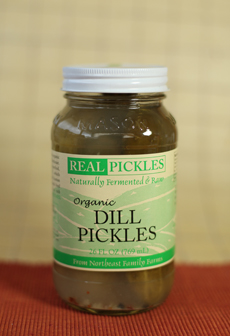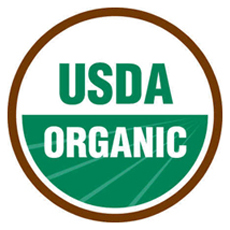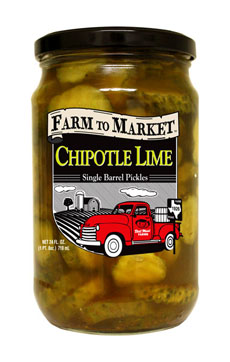

The word “organic” on a package has official significance. Many other terms do not. Photo by Elvira Kalviste | THE NIBBLE.
|
STEPHANIE ZONIE is a contributing editor at THE NIBBLE.
|
|
November 2013
|
 |
Pickle Parlance: Label Terms
Page 3: Watch Out For The Buzzwords
This is Page 3 of a seven-page article, plus six pages of artisan pickle brand reviews. Click on the black links below to visit other pages.
What The Words Mean
As with other categories of food, manufacturers slap buzzwords on the label. Some are helpful, some not. Can you blame them if they’re trying to get their product noticed and purchased? Can you expect all consumers to be as knowledgeable as THE NIBBLE staff? Well, you can’t blame us for pointing out the issues!
For more pickle parlance, see our Pickle Glossary.
All Natural/Natural/100% Natural. There is no legal definition for the term “natural,” and no government authority supervising the use of the word. However, consumers really respond to these terms. This means that manufacturers have no liability (except a moral one) to ensure that the ingredients are all natural.
Artisan/Artisanal/Handcrafted. These are popular phrases without legal definitions. These can mean just about anything, and they frequently do. Consumers respond positively to these terms, and there’s no authority overseeing the use of them. An artisan pickle should be made in small batches using old-fashioned techniques—no manufacturing line. One way to tell if it’s artisan: The absence of a nutrition label. The USDA does not require small producers (fewer than 10,000 units per SKU) to take on the expense of nutrition labeling. While some might argue that 10,000 jars a year is a lot, there is no industry terminology that differentiates someone who makes 500 jars of pickles from someone who makes 10,000 jars.
Gluten-Free. Really? We’re talking about pickled cucumbers! Are people so out of touch with what’s in their food that they don’t understand that pickled cucumbers don’t normally contain wheat protein? Of the more than 110 containers of pickles received for this study, the only one that might contain gluten is a jar of mustard pickles, which have a little flour or cornstarch as a thickener. Anyone who knows he/she is gluten sensitive would know to look at the label of flavored pickles.
Hand-Packed. Here’s a buzzword that is actually meaningful in some cases. A small-scale pickle manufacturer explained to me that a limitation of automatic canning equipment means that pickle jars filled by machine will have a lot of brine and not so many pickles. Pickles packed by hand into jars, on the other hand, will tend to contain a lot of pickle and less brine. This seems especially accurate with pickle chips. The exception to this rule are fermented pickles, which must be covered in brine if they’re going to keep, so you’re more likely to find more brine in those jars.
Healthy Snack. Are pickles really healthy? They aren’t particularly nutritious, but they are low in calories (check the sodium on the labels if you have a sodium issue) and, as such, are better-for-you snacks than many other choices. However, for a truly healthy snack, pick up an apple or some broccoli. See the Pickle Health Benefits section.
Low Carb. Many pickles are indeed low in carbohydrates, as should be expected from a food which has cucumbers, water, salt, and possibly vinegar as its main components. As with other green vegetables, cucumbers have a small amount of complex carbohydrate (the good type). If the pickles contain added sweeteners (bread & butter pickles or sweet and hot pickles do; some others might based on manufacturer preferences), there will be refined carbohydrates from the sugar, corn syrup or other sweetener. Some pickle manufacturers have taken to adding sweetener into what should be savory, tangy pickles. It’s part of the hidden sugar in foods that simply shouldn’t contain them. If you want to avoid added sugar, read the label!
No Fat/Fat-Free. Again, these are cucumbers! How much fat do cucumbers normally contain? They’re in brine made with salt, water, perhaps vinegar, herbs/spices, maybe some sweetener. Mercifully, the number of companies who advertised their pickles with these buzzwords was quite small.
Organic. Organic is a term with a legal underpinning. By law, packages with “organic” on the label have been certified by the USDA’s National Organic Program. The label should also carry the official USDA program seal. Here’s more about organic certification and organic products.
|
|
 |
Single Barrel Pickles. What does this mean? In theory, it means all the pickles of a certain batch were pickled in a single barrel at the same time. Maybe our great-grandparents made single barrel pickles. What does it mean today, when companies are producing thousands of cases of pickles?
Vegan. At least in the United States, pickled cucumber do not normally contain animal products. The possible exception to this is the use of honey in a small number of pickles I’ve come across (vegans will not consume honey, which is an animal product). Note that products like Unbound Pickling’s Bacon Pickle does not contain any pork products, so it, too, is vegan; the name comes from the hickory smoke flavor in the pickles. Even the Bacon Pickle from Paul’s Gourmet Products LLC, which looks as though there are small pieces of bacon afloat in the brine, doesn’t contain meat. Those are vegetarian bacon bits, it turns out; the Health Department won’t allow the use of the real thing. |
|

Can thousands of cases of pickles be made in a single barrel? Photo courtesy Farm To Market. |
Continue To Page 4: Pickles & Health
Go To The Article Index Above

|




